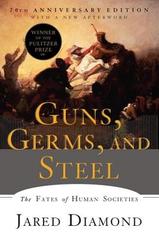 Guns, Germs, and Steel: The Fates of Human Societies (originally published in 1997 as Guns, Germs and Steel: A Short History of Everybody for the Last 13,000 Years) by Jared Diamond (W.W. Norton) won the 1998 Pulitzer Prize for general nonfiction. The book examines why Eurasian and North African societies survived and expanded over so much of the world at the cost of other cultures. The first reason was a series of positive feedback loops caused by denser human populations and corresponding agriculture, which necessitated a complex division of labor. Eurasian proximity to a wider array of livestock also gradually exposed them to more diseases over time rather than the sudden affliction of smallpox and measles on indigenous American people. Highly organized states with greater interchanges of people and ideas fostered conditions for advanced technological development capable of producing guns and steel.
Guns, Germs, and Steel: The Fates of Human Societies (originally published in 1997 as Guns, Germs and Steel: A Short History of Everybody for the Last 13,000 Years) by Jared Diamond (W.W. Norton) won the 1998 Pulitzer Prize for general nonfiction. The book examines why Eurasian and North African societies survived and expanded over so much of the world at the cost of other cultures. The first reason was a series of positive feedback loops caused by denser human populations and corresponding agriculture, which necessitated a complex division of labor. Eurasian proximity to a wider array of livestock also gradually exposed them to more diseases over time rather than the sudden affliction of smallpox and measles on indigenous American people. Highly organized states with greater interchanges of people and ideas fostered conditions for advanced technological development capable of producing guns and steel.
According to Diamond, those weapons, plus various viruses, settled the course of human history. A documentary version of Guns, Germs, and Steel produced by the National Geographic Society was broadcast on PBS in 2005. In 2017, Norton published a 20th-anniversary edition of Guns, Germs, and Steel with a new afterword by the author ($18.95).

